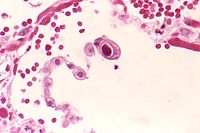
Photo from wikipedia
Encephalitozoon cuniculi (E. cuniculi) is a fungi-related, obligate, zoonotic, spore-forming intracellular eukaryotic microorganism. This emerging pathogen causes granulomas in brain and kidneys of infected individuals. The objective of this study… Click to show full abstract
Encephalitozoon cuniculi (E. cuniculi) is a fungi-related, obligate, zoonotic, spore-forming intracellular eukaryotic microorganism. This emerging pathogen causes granulomas in brain and kidneys of infected individuals. The objective of this study was to detect the distribution of CD4, CD8 and MHCII-positive cells within granulomas in these organs in infected immunocompetent (group A) and infected immunosuppressed (group B) New Zealand white rabbits using immunohistochemistry. In brain, labeled CD4 immune cells were mainly located in the periphery of granulomas in group B. Kidneys of groups A and B, displayed CD4-positive in granulomas and were significant different when compared to brain. CD8 immune cells in brain and kidneys were disseminated in the granulomas in groups A and B; however, no significant difference was observed. MHCII-positive cells were more numerous in brain sections of group B and were significantly different when compared to kidney sections. Granulomas were not observed in control animals of group C and D. In conclusion, we identified CD4-positive cells in both the brain and kidneys of immunocompetent and immunosuppressed animals; CD8-positive cells were more numerous in brain of immunosuppressed rabbits and MHCII cells were more predominant in brain of immunocompetent rabbits. Apparently, the immunosuppression stimulated a change in the cellular phenotype of Th1- to Th2-like granulomas in brain and kidneys by an unknown mechanism. These results increase our understanding of CD4, CD8 and MHCII positive cells within the E. cuniculi granuloma microenvironment and will help in future microsporidian granulomas studies of both immunocompetent and immunosuppressed individuals.
Journal Title: Comparative immunology, microbiology and infectious diseases
Year Published: 2019
Link to full text (if available)
Share on Social Media: Sign Up to like & get
recommendations!